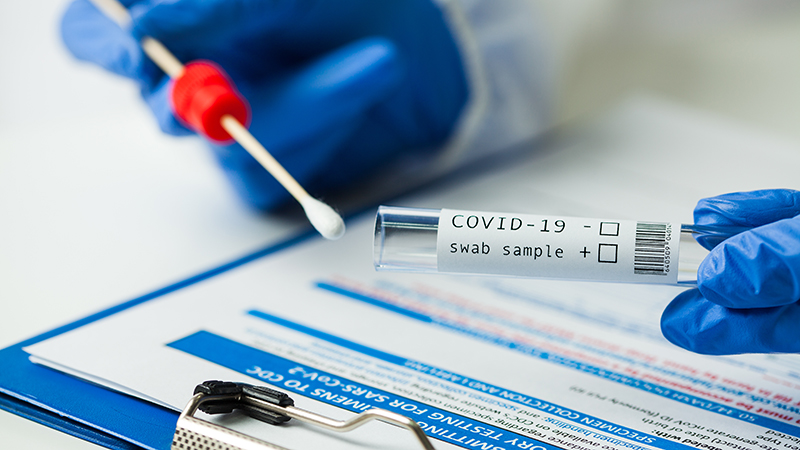The COVID-19 nasal swab PCR test is accurate and reliable for COVID-19 diagnosis. A positive test indicates that you have COVID-19. A negative test shows that you were not infected with COVID-19 at the time of the test. If you exhibit symptoms of COVID-19 or have been exposed to someone who has tested positive for COVID-19, you should get tested.
What is a PCR test, and how does it work?
The acronym PCR stands for a polymerase chain reaction. It’s a test that looks for genetic material from a particular creature, like a virus. If you have a virus at the time of the trial, the test will detect its existence. Even if you are no longer sick, the examination may reveal virus fragments.
A COVID-19 PCR test is a test that detects the presence of the virus COVID-19.
The COVID-19 polymerase chain reaction (PCR) test is a molecular test that looks for genetic material (ribonucleic acid or RNA) of SARS-CoV-2, the virus that causes COVID-19, in your upper respiratory specimen. Small amounts of RNA from models are amplified into deoxyribonucleic acid (DNA), which is duplicated until SARS-CoV-2 is identifiable if present, using the PCR technique. Since its approval in February 2020, the PCR test has been the gold standard for diagnosing COVID-19. It’s accurate and trustworthy.
Who should do a PCR Covid-19 Test?
If you experience any of the following symptoms, your healthcare professional may prescribe COVID-19 testing:
- Fever or chills are two symptoms of a fever.
- Cough.
- Breathing difficulties or shortness of breath.
- Fatigue.
- Aches in the muscles or throughout the body.
- Headache.
- A new loss of flavor or odor has occurred.
- I have a sore throat.
- Congestion or a runny nose are two common symptoms of congestion.
- Vomiting or nausea.
- Diarrhea.
COVID-19 does not cause symptoms in everyone. And not everyone who is ill exhibits all of the symptoms described above. Even if you’ve been vaccinated, if you’re feeling poorly during the COVID-19 pandemic, please contact your healthcare provider.
The COVID-19 PCR test consists of three steps:
- A swab collects respiratory debris discovered in your nose by a healthcare expert. A swab is a long, flexible stick with a soft tip that enters your nose. Nasal swabs, which gather a sample immediately within your nostrils, and nasopharyngeal swabs, which collect a piece farther into the nasal cavity, are two types of nose swabs. Collecting material for the COVID-19 PCR test can be done with any swab. The swab is sealed in a tube and delivered to a laboratory after collection.
- Extraction: When a laboratory scientist obtains a sample, they isolate (extract) the genetic material from the rest of the samples contents.
- The PCR process, which involves special chemicals and enzymes as well as a PCR machine known as a thermal cycler, is next performed. The targeted genetic material in the test tube grows (amplifies) with each heating and cooling cycle. After many rounds, the test tube contains millions of copies of a small piece of the SARS-CoV-2 virus’s genetic material. If SARS-CoV-2 is present in the sample, one of the compounds in the tube emits a fluorescent light. The PCR machine can detect this signal once it has been amplified sufficiently. Scientists interpret the signal as a positive test result using specific software.
What do the findings of the COVID-19 PCR test mean?
A positive test result indicates that you are likely infected with SARS-CoV-2. This could be due to asymptomatic infection, but if you have symptoms, you have COVID-19. Most people have minor illnesses and may recover at home without medical assistance. If your symptoms worsen or you have any questions or concerns, contact your healthcare professional.
A negative test result indicates that you were not infected with SARS-CoV-2 when your samples were taken. However, it is possible to have COVID-19 without the virus being detected by the test. This could happen if you’ve recently become infected but haven’t yet shown symptoms or had COVID-19 for more than a week before getting tested. A negative test does not guarantee you are immune to COVID-19 for the rest of your life: you could be exposed to COVID-19 after your trial, become infected, and spread the SARS-Cov-2 virus to others.
If your test comes back positive, speak with your doctor, stay at home, and isolate yourself from others. If your test is negative, continue to protect yourself and others from COVID-19 infection. Learn more about what to do if you test positive for COVID-19 and how to avoid becoming infected.
How long does it take to acquire the results of a coronavirus test?
Your test results should arrive within 24 hours of sample collection, but it may take a few days, depending on how long the sample takes to reach the laboratory.
How long after having COVID-19 do you test positive?
The PCR test may detect tiny amounts of virus material since it is so sensitive. This suggests that even after you’ve recovered from COVID-19 and are no longer contagious, the test can detect bits of the SARS-CoV-2 virus. Though you’ve had COVID-19 in the past, you may continue to test positive even if you can’t distribute the SARS-CoV-2 virus to others.
Long-term infection in immunocompromised people might result in the transmission of infectious virus for months. In addition, healthy persons can re-infect themselves. Please consult a healthcare physician if you test positive for SARS-CoV-2 but believe you have already recovered from COVID-19.
What’s the difference between COVID-19 PCR and antigen tests?
The PCR and antigen tests are the two types of COVID-19 assays.
- Chain polymerase reaction (PCR): As the virus breaks down, this test looks for the presence of the virus’s genetic material or fragments. PCR is the most reliable and accurate diagnostic for detecting current infection. The majority of PCR tests take several hours to complete. However, others are faster.
- Antigen test: This detects antigens and pieces of proteins on the virus’s surface. Antigen tests are usually completed in 15 to 30 minutes. Rapid antigen tests are most accurate when utilized within a few days of the onset of symptoms when the virus is in the highest concentration in your body.
Which COVID test is the most reliable?
The antigen test is usually faster than the PCR test but less sensitive. If an antigen test is negative, your healthcare practitioner may request a PCR test to confirm the negative antigen test result because antigen tests are not as accurate as the cheapest PCR test in Dubai.
What is the best way to find out where I can get tested for COVID-19?
You should get tested if you have COVID-19 symptoms or have been exposed to persons who have symptoms or have tested positive. Consult your healthcare provider first. They will discuss your symptoms with you in person or over video chat. The provider may request a test and assist you in locating a testing facility and time if necessary. Remember that if you’ve been exposed to the SARS-CoV-2 virus but haven’t yet developed symptoms, you should call ahead to ensure the testing facility can accommodate you.
You can also check with community health centers or urgent care centers or contact or visit the websites of nearby hospitals in your health insurance network. Links to community-based testing sites in your state are provided by the US Department of Health and Human Services. You can also get the most up-to-date information on testing places by visiting the websites of your state or local health agency. These state and local health departments can be found through the Centers for Disease Control and Prevention.
A Message from Royal Premiere Healthcare:
Royal Premiere Health Care is a reputable, licensed, and well-known at-home healthcare company with a history of providing accurate and consistent outcomes.
We give these high-quality home healthcare services including doctor on call, physiotherapy at home, and Pcr test at home to keep our patients busy and happy, minimizing the risk of adverse outcomes. Our home nurses also ensure that the patient receives the necessary therapy as soon as possible, allowing them to recover quickly.
We aim to get results to our clients within a few hours so that they can plan their efforts accordingly. As a result, our clients have placed their faith in us and prefer us over others. We make the entire process open and enjoyable, from our standards and techniques to delivering results.
So, if you’re considering completing a PCR test at home Dubai, go with the most respected name in the business and be tested by an accredited healthcare provider.
COVID-19 dissemination can be slowed by using accurate and rapid diagnostics. If you start to have symptoms, contact your healthcare practitioner or your local public health department to find out where you may get tested. You can trust your doctor to recommend the quickest and most accurate test possible. Wear a face mask that securely fits your nose, mouth, and chin to protect others around you, and avoid close contact with people until you receive the results of your COVID test. Keep an eye on your symptoms and get medical help if you have:
- I’m having trouble breathing.
- Chest pain or pressure that persists.
- There’s a new level of perplexity.
- I can’t wake up or remain awake.
- Blue lips or a blue face
Read More: New COVID-19 Safety Amenities Hotels Provide For Their Guests

